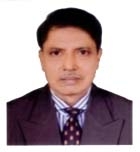
Dr. Forqan Uddin Ahmed :
Language is a powerful tool in preserving cultural heritage of a nation and therefore, is treated as the cultural heritage of a nation-state. Mother tongue will not only encourage linguistic diversity, also contribute to the development and understanding of linguistic culture. Here lies the significance of International Mother Language Day to give all mother tongues a chance to develop, to give them due status, to protect them from extinction, not to try to dominate any weak language, to show equal respect to all languages, big and small.
On this day of February 21 as International Mother Language Day, people almost all over the world are being inspired to love their mother tongue keeping Ekushey ideology in their senses. The Bengali nation with its own blood taught the whole world the concept of love towards language. The meaning of Mother Language Day is to love the country, love the people of the country, love the culture of the country, love its way of life and to be proud of it.
Language is not only the principal representative of a culture of one nation but it also creates sense of patriotism and nationalism in people’s mind. Bengali and Bangla language is an appropriate example of that. Bengali people created one of the greatest political and cultural histories in the 20th century.
Bengali is the mother tongue of 22 crores of people of the world, the state language and official language of Bangladesh. The Bengali language is being widely used in government offices-courts, private offices, at all levels in educational institutions and in various levels of national and social life in Bangladesh. People of Bangladesh started their language movement at the beginning of 1948. Students went on strike on 26 February, 1948. The All Party Action Committee, was formed on 2 March, 1948, and a strike was called across the country on 11 March, 1948. The slogan, “we want Bangla as a State Language” chanted by people on the streets. Police beat them mercilessly. Language movement reached its climax on 21 February, 1952 through such small protests at different times. The Prime Minister of Pakistan, Khaja Nazimuddin visited East Pakistan on 27 January 1952 and like his predecessor Jinnah, he declared that Urdu would be the only national language of Pakistan. The people became furious and the movement became violent from then on, and the All Party Action Committee called a nationwide strike on 21 February 1952 as a protest against Nazimuddin’s announcement. They again raised the issue of making Bangla as one of the national languages of Pakistan. The Government promulgated special powers (section144) into force from 20 February and banned all sorts of meetings and processions for 30 days.
The All Party Action Committee decided not to break the 144. However, general students from Dhaka University thought otherwise and they gathered on the University campus and came out as a team of 10 members from early morning on 21 February. Police challenged them but in vain. There were fights between Police and the general public for the whole day in different places and at last the armed forces came in and fired many round of fire arms. Many Students and general public were killed. It is still impossible to know the number of people killed because police took dead bodies aside. However, Pakistan Government published a press release on 24 February, 1952 about the killings by the police and they admitted killing of 6 students. They were: Abul Barkat, Rafiquddin, Abdul Jabbar, Shafiur Rahman, Wahedullah and Abdul Awal. Two names were already known to be missing from that Government List – Abdus Salam and Salauddin. So, it leads many to believe that the true number will never be known.
The Pakistani government wanted to deny the existence of a language like Bangla in the name of religion. When they were not able to do that, they conspired in other ways against the Bangladeshis, such as trying to replace Bangla alphabet with Arabic, banning 100 years birthday celebration of Rabindranath Tagore, prohibiting broadcast of Rabindrasangeet (songs of Rabindranath) in the government- controlled media and so on. But they did not realize the power of language. The power had been proved through the sacrifice of the people of Bangladesh. Thus it is logical that if world leaders want to select a day as a specific Mother Language Day, 21 February must be considered. This is because no other nation has ever sacrificed their lives in such a way as Bengali people did to defend their Mother language.
The freedom movement started with the demand of mother language. In this context, armed struggle was conducted and we achieved our great freedom. The struggle to establish the Bengali language in the world never stopped. Finally, in November 1999, the United Nations Educational, Scientific and Cultural Organization (UNESCO) recognized Ekushey February as ‘International Mother Language Day’ by the request of the expatriate Bengali youth in Canada and with the initiative of the Government of Bangladesh. Then on May 16, 2000, it was decided that every country in the world would celebrate the mother tongue with due dignity. It is mentioned that the goal is to protect the language of all people around the world. This is a huge achievement of the language-loving Bengali nation.
(Dr. Forqan is Former Deputy Director
General, Bangladesh Ansar & VDP).

